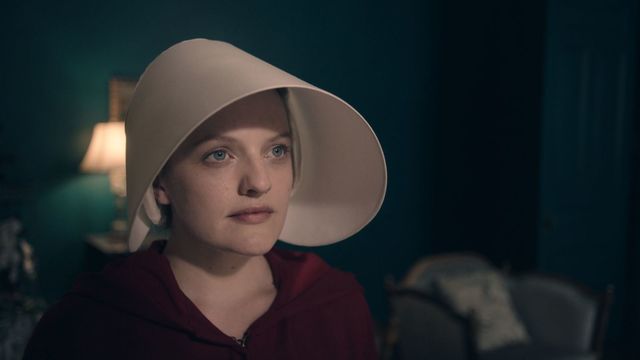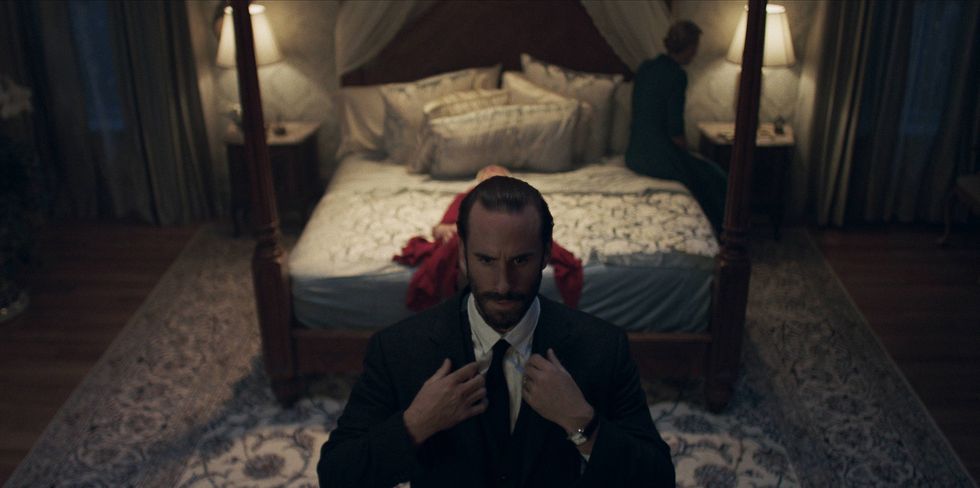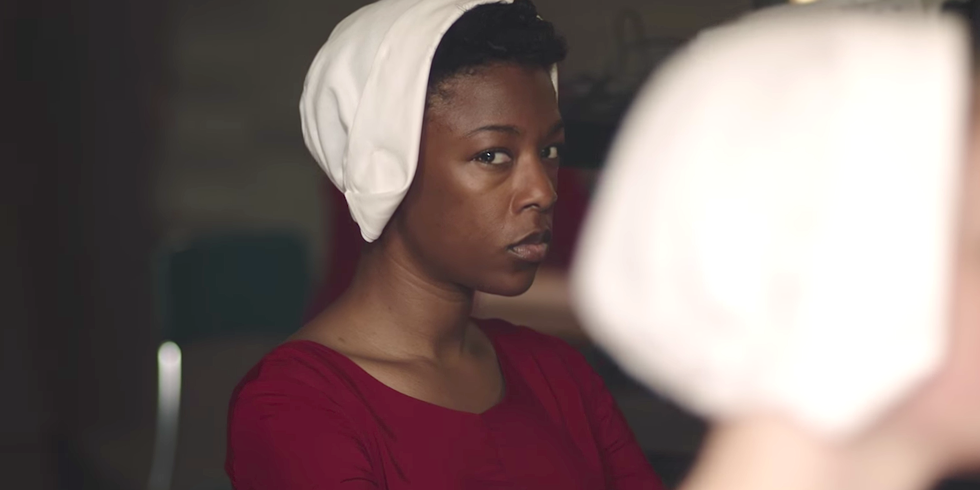In Trump's America, everything is political, and all of pop culture becomes commentary, whether it wants to be or not. From the beginning of 2017, TV shows from Scandal to The Young Pope to Big Little Lies have been mined for insights about our new political reality, despite having been written and filmed well before the election. But you won't see a more timely or essential onscreen story this year than Hulu's extraordinary rendering of Margaret Atwood's 1985 novel The Handmaid's Tale, reimagined as a fundamentalist nightmare for the Mike Pence era.
Elisabeth Moss gives a simmering, rich performance as Offred, a protagonist we meet throughout several stages of her development, from a spirited young woman in modern America to a meek sexual slave in a totalitarian regime. Through offhand dialogue and chilling nonlinear flashbacks, we learn how society crumbled following a sharp decline in pregnancies and an increase in miscarriages and stillbirths. As childbirth became a national obsession, women's rights were gradually stripped back and America transformed into the Republic of Gilead, a militarized religious dictatorship promising a "return to traditional values."
That line is one of many that strikes uncomfortably close to real-world political rhetoric. In Gilead there is no room for science or medical fact—academics are one of the many groups routinely executed—and women are silent, passive vessels for pregnancy. As one of the few remaining fertile women, Offred is forced into sexual slavery as a "handmaid" in the household of a commander (Joseph Fiennes), whose wife (Yvonne Strahovski) is infertile. But Offred is already a mother, and her determination to survive and reunite with her young daughter is what keeps her from giving up, as the commander routinely tries to impregnate her with sex that is at once ceremonial and completely mechanical. (At risk of making the show sound like a Pence family SNL skit, handmaids are only permitted to be with men while their wives are also present.)
Her role is that of "a womb with legs," as Offred drily puts it in voiceover, a device that allows The Handmaid's Tale some scant levity. In order to survive, Offred must be placid and polite and endlessly deferential, her conversation limited to dull platitudes. But in her own mind, she can be irreverent and foul-mouthed and even backtalk her fellow handmaids, at one point dubbing Alexis Bledel's Ofglen a "pious little shit."
It's not insignificant that the first three episodes of The Handmaid's Tale are directed by a woman, cinematographer Reed Morano, who brings ravishing depth to the show's palette, drawing a stark contrast between the primary colors of the handmaids and wives' robes and the muted tones of the fallen world they inhabit.
But the show's most chilling scenes take place not in Gilead, but in the entirely ordinary world that preceded it. The season's third episode contains a standout scene in which Offred, then named June, and her best friend Moira (Samira Wiley) stop at their neighborhood coffee shop after going for a run. A tense moment over a declined payment turns ugly when the barista abruptly escalates things, calling June and Moira "fucking sluts." They're disturbed, but they brush it off, dismissing the attack with laughter and false bravado, because that's what women learn to do with harassment. The episode only gets more horrifying from there, depicting the final days of America as a series of creepy bureaucratic evils culminating in an ill-fated women's march. But that coffee shop scene, the smallness of it, taps into many women's worst fears about the deeper power imbalance that lies behind everyday sexism.
The Handmaid's Tale will be released weekly on Hulu (the first three episodes drop April 26) and deserves to be savored rather than binged in all its beautiful ingenuity. For anyone engaged in real-world debate about women's reproductive rights, the show is also too bleak to binge, since it's a series of familiar ideas taken to their illogical extreme. The only time handmaids are treated as important, or even as human, is when they might be pregnant. A handmaid's personhood begins and ends with that of her potential fetus. Handmaids have no autonomy or agency; their reproductive choices are dictated solely by men. Like all the best dystopias, Gilead is not a truly fictional world, and The Handmaid's Tale is not a dark fantasy. It's a warning.















